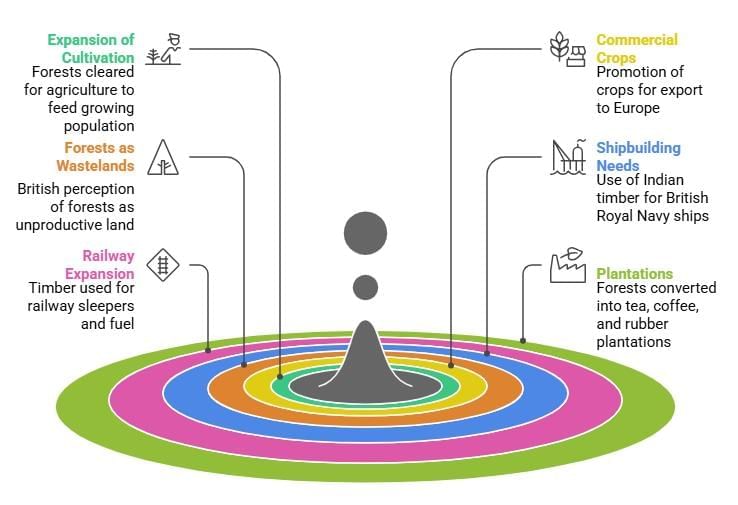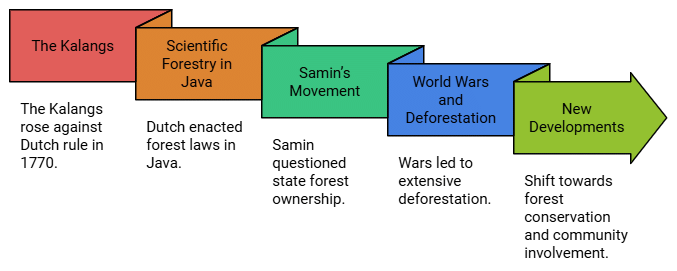Class 9 Exam > Class 9 Notes > Social Studies (SST) Class 9 > Key Concepts - Forest Society & Colonialism
Key Concepts - Forest Society & Colonialism | Social Studies (SST) Class 9 PDF Download
| Table of contents |

|
| Deforestation |

|
| The Rise of Commercial Forestry |

|
| Impact on People |

|
| Forest Rebellions |

|
| Forest Transformations in Java (Indonesia) |

|
| Glossary and Important Information |

|
Deforestation
- Deforestation means the cutting down of trees on a large scale.
- It became systematic and extensive under British colonial rule.
- Forests were cleared for cultivation, commercial crops, timber, and railways.
Reasons for Deforestation
- Expansion of Cultivation:
As population increased, peasants cleared forests to grow more food. Cultivation was seen as a sign of progress. - Commercial Crops for British Industries:
Crops like jute, sugar, cotton, and wheat were promoted for export to Europe as raw materials. - Forests as ‘Wastelands’:
The British believed forests were unproductive as they did not generate revenue. - Shipbuilding Needs:
Oak forests in England were depleting. Indian forests were used to supply timber for Royal Navy ships. - Railway Expansion:
Railways needed land and huge amounts of timber for sleepers and fuel. Each mile of railway track required thousands of sleepers. - Plantations:
Large areas of natural forests were cleared for tea, coffee, and rubber plantations. Land was given cheaply to European planters.
The Rise of Commercial Forestry
- German expert Dietrich Brandis was appointed as the first Inspector General of Forests in India in 1864.
- Indian Forest Service was started in 1864 and the Indian Forest Act was passed in 1865 (amended in 1878 and 1927).
- Imperial Forest Research Institute was established in Dehradun in 1906 to train officials in scientific forestry.
 The Imperial Forest Research Institute
The Imperial Forest Research Institute
Scientific Forestry
- In this method, natural forests were replaced by single-species plantations.
- Forest officials made working plans to control cutting and replanting.
- The Forest Acts divided forests into
The villagers were dissatisfied with the Forest Acts. They were now forced to steal wood from the forests. If they were caught, they were punished.
Impact on People
- Loss of Forest Rights:
Villagers were banned from collecting wood, grazing cattle, and hunting. Many were forced to steal resources and were punished or harassed. - Shifting Cultivation Banned:
Traditional farming practice like jhum (swidden agriculture) was prohibited. This caused displacement and loss of livelihood. - Hunting Restrictions:
Local people were banned from hunting, but British officials hunted animals as a sport. Rewards were given for killing tigers, leopards, etc. - New Trade and New Employment:
Some adivasi groups traded forest produce or worked on plantations but faced low wages and harsh conditions.
Question for Key Concepts - Forest Society & ColonialismTry yourself: What was one of the reasons for deforestation during the colonial rule?View Solution
Forest Rebellions
- Forest communities resisted colonial forest policies.
- Bastar Rebellion (1910):
- Led by Dhurwas of the Kanger forest; Gunda Dhur was a key figure.
- Sparked due to forest reservation and loss of rights.
- British suppression followed, but reservation plans were reduced after the revolt.
Forest Transformations in Java (Indonesia)

- The Kalangs:
- They rose in rebellion against the Dutch in 1770 but their uprising was suppressed. - Scientific Forestry in Java:
- Forest laws were enacted in Java. The villagers resisted these laws.
- Forest timber was used for ships and railway sleepers.
- The Dutch government used the ‘blandongdiensten’ system for extracting free labour from the villagers. - Samin’s Movement:
- Samin of Randublatung village (a teak forest village) questioned the state ownership of forests. A widespread movement spread.
- They protested by lying on the ground when the Dutch came to survey it and refusing to pay taxes and perform labour. - World Wars and Deforestation:
- The world wars had a major impact on forests. The forest department cut freely to meet the British demands.
- The Dutch followed the scorched earth policy of destroying saw mills, burning logs of teak so that the Japanese could not benefit from it.
- The Japanese forced the villagers to cut down forests when they occupied the area. - New Developments in Forest Management:
- From the 1980s, conservation and community participation became a focus.
- Sacred groves like sarnas (Jharkhand), devarakadu (Karnataka), rai, and kan were protected by locals.
- Joint forest management and local patrols began to replace exclusionary colonial forest policies.
Glossary and Important Information
- Biodiversity: Variety of plant and animal life in a given environmental setting. e.g., biodiversity of the Himalayas or the biodiversity of the Amazon refers to all the life that exists there.
- Tropics: Areas with a hot, steamy, and humid climate, usually near the equator.
- Logging: Selective cutting targets only a few valuable trees. But this often harms the forest more than expected.
- Terra Nullius: In its simplest sense, it means land belonging to no one. Antarctica is terra nullius.
- Indispensable: Essential, necessary, crucial, very important.
- Reclaiming: Converting unusable or degraded land into productive land.
- Poaching: Take game (animals) illegally from protected areas or forests.
- Pargana: A cluster of villages, also an administrative unit.
The document Key Concepts - Forest Society & Colonialism | Social Studies (SST) Class 9 is a part of the Class 9 Course Social Studies (SST) Class 9.
All you need of Class 9 at this link: Class 9
|
63 videos|637 docs|78 tests
|
FAQs on Key Concepts - Forest Society & Colonialism - Social Studies (SST) Class 9
| 1. What is deforestation? |  |
Ans. Deforestation refers to the clearing, removal, or destruction of a forest or stand of trees, often for the purpose of converting the land to non-forest use. It is mainly caused by human activities such as agriculture, logging, urbanization, and infrastructure development.
| 2. What is commercial forestry? |  |
Ans. Commercial forestry is the practice of growing and managing forests for the purpose of producing timber and other forest products on a large scale. It involves the cultivation of fast-growing tree species in monoculture plantations, which are then harvested for commercial purposes such as timber production or pulp and paper manufacturing.
| 3. What are forest rebellions? |  |
Ans. Forest rebellions refer to uprisings or resistance movements that take place in response to the exploitation and destruction of forests by colonial powers or commercial entities. These rebellions are often led by indigenous or local communities who have been adversely affected by the loss of their traditional livelihoods and the environmental impacts of deforestation.
| 4. How are changes in JAVA related to deforestation? |  |
Ans. The term "changes in JAVA" in the context of this article seems to be a typographical error or unrelated to the topic of deforestation. There is no direct correlation between deforestation and changes in the programming language Java.
| 5. What are some important concepts related to forest society and colonialism? |  |
Ans. Some important concepts related to forest society and colonialism include the impact of colonial policies on indigenous communities and their land rights, the role of commercial forestry in shaping forest landscapes, the resistance movements against deforestation, and the socio-economic consequences of deforestation for local communities. Additionally, the concept of forest governance and the power dynamics between colonial powers and indigenous communities are also important aspects to consider.
Related Searches





















